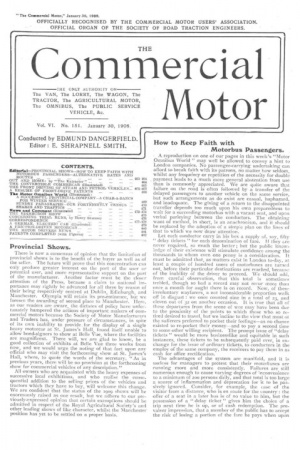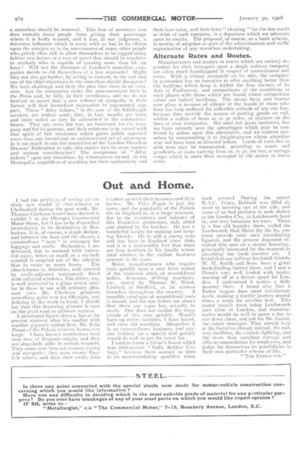Provincial Shows.
Page 1

Page 2

If you've noticed an error in this article please click here to report it so we can fix it.
There is now a consensus of opinion that the limitation of provincial shows is to the benefit of the buyer as well as of the seller. The future will prove that this concentration can only produce greater interest on the part of the user or potential user, and more representative support on the part of the manufacturer. Another factor must be the closer attention of the Press, because a claim to national importance may rightly be advanced for all three by reason of their being respectively centred at Dublin, Edinburgh, and Manchester. Olympia will retain its pre-eminence, but we foresee the awarding of second place to Manchester. Here, as our readers are aware, the dictates of policy have unfortunately hampered the actions of important makers of commercial motors because the Society of Motor Manufacturers and Traders has, under pressure of circumstances, in spite of its own inability to provide . for the display of a single heavy motorcar at St. James's Hall, found itself .unable to allow bond-signers to show at Belle Vue, Where the facilities are magnificent.. There will, we are glad to know, be a good collection. of exhibits at Belle Vue three weeks from now and we would urge. the noting of that fact upon any official who may visit the forthcoming show. at St. James's Hall, where, to quote the words of the secretary, " As in .previous years, there will be no provision at the forthcoming show for commercial vehicles of any description." All owners who are acquainted with the heavy expenses of successive focal exhibitions, and who realise the consequential addition to the selling prices of the vehicles and tractors which they have to buy, will welcome this change. We are confident that the status of the t000 shows will be enormously raised as one result, but we adhere to our previously-expressed opinion that certain exemptions should be admitted in respect of the Royal Agricultural Society's and other leading shows of like character, whilst the Manchester position has yet to be settled on a proper basis. How to Keep Faith with
• Motorbus Passengers. .
A reproduction on one of our pages in this week's "Motor Omnibus World " may well be allowed to convey a hint to London companies. No passenger-carrying undertaking can afford to break faith with its patrons, no matter how seldom, whilst any freque'ncy or repetition of the necessity for double payment leads to a much more general abstention from use than is commonly appreciated. We are quite aware that failure on the road is often followed by a transfer of the delayed passengers to another vehicle on the same service, but such arrangements as do exist are casual, haphazard, and inadequate. The giving of a return to the disappointed traveller depends too much upon his own preparedness to wait for a succeeding motorbus with a vacant seat, and upon verbal parleying between the conductors. The obtaining want of method, in short, is an anachronism, and it should be replaced by the adoption of a simple plan on the lines of that to which we now draw attention.
Let each conductor carry in his box a supply .of, say, fifty " delay tickets " for each denomination of fare. If they are never required, so much the better; but the public knowledge of their existence will stimulate confidence among the thousands to whom even one penny is a consideration. It must be admitted that, as matters exist in London to-day, at least a couple of hundred users of motorbuses are turned out, before their particular destinations are reached, because of the inability of the driver to proceed. We should add, from careful observation, that this total is sometimes trebled, though so bad a record may not recur more than once a month for aught there is on record. Now, of these involuntary wayfarers, a not inconsiderable proportion walk off in disgust : we once counted nine in a total of 23, and eleven out of 32 on another occasion. It is true that all of these departures from the scene of woe may have been due to the proximity of the points to which those who so retired desired to travel but we incline to the view that most oi the sufferers preferred to pocket their feelings—as no chance existed to re-pocket their money—and to pay a second time to some other willing recipient. The prompt issue of "delay tickets " would he more businesslike and equitable in such instances, these tickets to be subsequently paid over, in exchange for the issue of ordinary tickets, to conductors in the employ of the same company, the receivers to pay them in as cash for office rectification.
The advantages of the system are manifold, and it is useless for managers to protest that their motorbuses are running more and more consistently. Failures are still numerous enough to cause varying degrees of inconvenience to a minimum of 200 persons daily, and that total is too large a source of inflammation and deprecation for it to be passively ignored. Consider, for example, the case of the visitor from a distance, who is en route for the tountry : the offer of a seat in a later bus is of no value to him, but the possession of a " delay ticket " gives him the choice of a trip next time he is up, or of cash redemption. The prevalent impression, that a member of the public has to accept the risk of losing a portion of the fare he pays when upon a motorbus should be removed. This fear of monetary loss does restrain many people from giving their patronage where it is badly wanted, and it has, in our judgment, a deterrent influence which is every Whit as bad in its effects upon the receipts as is the nervousness of many other people who grimly elect still to allow themselves to be jogged along behind two horses at a rate of speed that should be repulsive to anybody who is capable of earning more than 6d. an hour! Will not the directors of London's motorbus companies decide to rid themselves of a just reproach? Might they not also go farther, by acting in concert, to the end that one of the chief objections to the motorbus should disappear? We both challenge and deny the plea that there is no occa. sion. Let the companies make the announcement both in the Press and, by bills, in their omnibuses, and we do not hesitate to assert that a new volume of sympathy in their favour will find immediate expression in augmented support. These " delay tickets," in the case of the Edinburgh services, are seldom used ; they, in fact, usually get more and more soiled as they lie untouched in the conductors' boxes. They are, none the less, an insurance for the company and for its patrons, and their existence is in accord with that spirit of fair treatment which gains public approval more than any intentional or unintentional act of smartness. Is it too much to ask the committee of the London Omnibus Owners' Federation to take this matter into its most earnest and serious consideration? The acceptance of " delay tickets " upon any motorbus—by whomsoever ownedin the Metropolis, regardless of anything but their authenticity and
their face value, and their later " clearing " for the due credit or debit of each company, is a departure which we advocate upon its merits. The proposal, of course, as a basic scheme, is worthy of adoption as part of the advertisement and traffic organisation of any motorbus undertaking.
Alternate Rates and Routes.
Manufacturers and traders in towns which are entirely dependent for their transport upon a single railway company are often much handicapped in respect of conveniences and rates. With a virtual monopoly on its side, the company in possession has no incentive to offer anything better than the facilities which keep it within the four corners of its Acts of Parliament, and comparisons of the conditions at such places with those which are found where competition exists are indeed invidious. The steam lorry and tractor now place a weapon of offence in the hands of those who have tan long endured the inflexible attitude of any one line, because they provide the means of putting goods on rail, within a radius of. from so. to .30 miles, at stations on the lines of rival companies. We need not quote instances, but we have recently seen the advantages which may he conferred by action upon this alternative, and we content ourselves by commending it to freight-payers whose attention may not have been so directed before. Loads of from five to nine tons may be transported, according to roods and gradients, at costs varying from is. to 35. per ton, a cartage outgo which is more than recouped by the access to lower rates,




















